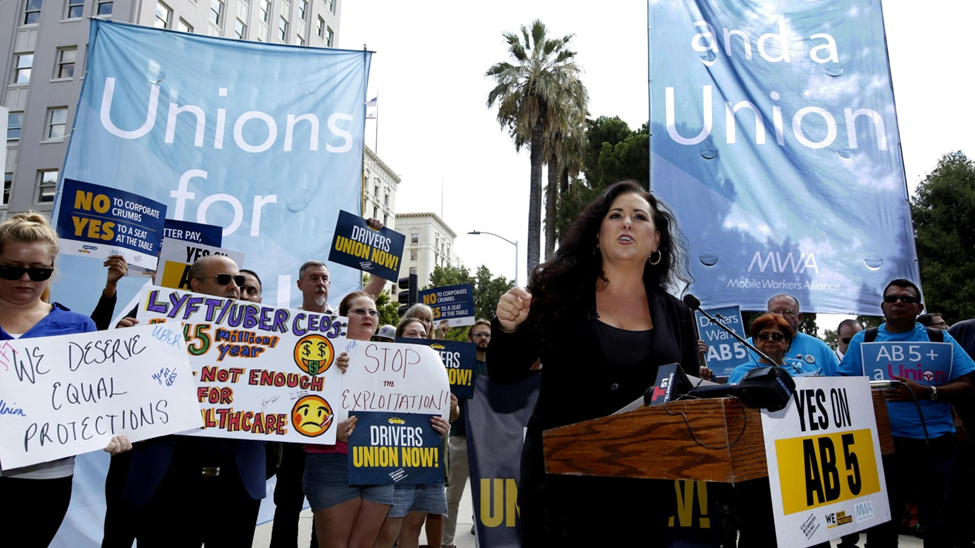In September 2019, California’s new elected Governor Gavin Newsom signed the AB-5 bill into the law known as California Assembly Bill 5 (AB5) or ‘Gig Worker Bill’. It is expected to come into force on January 1st, 2020 and will require companies and employers employing independent contractors to reclassify them as workers not as contractors, with a few exceptions. The bill expands on a ruling made in a case that reached the California Supreme Court in 2018, Dynamex Operations West, Inc. vs. Superior Court of Los Angeles.
The California bill, known as AB5, expands a groundbreaking California Supreme Court decision last year known as Dynamex. The ruling and the bill instruct businesses to use the so-called “ABC TEST” to figure out whether a worker is an employee OR an independent contractor in the employment industry.
Under the ABC Test a worker is presumed to be an employee—and the burden to demonstrate their independent contractor status is placed squarely on the shoulders of the hiring company, which means that everything falls on the shoulders of an employer providing employment. To do this successfully a company must demonstrate (the emphasis is on “demonstrate” as scrupulous documentation is critical) that the worker satisfies all 3 criteria of the test (1 or 2 doesn’t cut it or let it go).
A worker can only be classified as an independent contractor if:
- the worker is free from control and direction in the performance of services;
and
- the worker is performing work outside the usual course of the business of the hiring company;
and
- the worker is customarily engaged in an independently established trade, occupation, or business.
The bill focuses on improving working conditions for “gig” economy workers at places like Uber Technologies (ticker: UBER), Lyft (LYFT), DoorDash (food delivering business), Postmates, and Instacart. AB5 enshrines into law a 2018 California Supreme Court decision, which laid out rules for classifying workers as contractors. The toughest bit: contract work must be “outside the usual course of the hiring entity’s business.” The law primarily hits contract workers like drivers and delivery folks, but it also applies to folks like golf caddies, freelance journalists, and exotic dancers, while in the exotic business, the girls they pay the owners of the bars and dance clubs and truck drivers and haulers are also targets of this gig bill.
Under AB5, they are protected by U.S. labor laws. Employers will have to pay Social Security and payroll taxes, unemployment insurance, and state employment taxes, while providing workers’ compensation insurance and complying with minimum wage laws. Uber and Lyft didn’t answer my questions this past week on how exactly they’ll apply the new law. Uber has previously claimed that they aren’t running a transportation business but rather a tech business, and thus not covered by AB5. That view is sure to be tested in court.
Lot of trucking companies are worried of this bill and concerned about the new AB5 BILL and as well as DOT Laws. But certainly lot of trucking companies have already implemented payroll services and as well as have workers compensation insurance for their employees.
Digging deeper
With the enforcement of this bill not only the cost of the business owners would rise but it will also lead to workers fallout. Federal law, through the Form I-9 process, requires employers to verify that every employee is eligible to work in the United States at the time of hiring. This is the “show your passport/work permit or green card including the social security card” process we have all been through—unless you are an independent contractor. Independent contractor eligibility to work in the US is spotty at best. In fact, some experts estimate that ineligible workers may make up as much as 25% of the total Uber/Lyft workforce in some areas. How will California potentially absorb tens of thousands of workers in the event that they are suddenly turned away from Uber and Lyft because they cannot meet I-9 requirements? No one is quite sure Earlier, the independent contractors who were hired by the companies didn’t necessarily require a social security number nor did the employers cared to verify the same. This let the foreign truck drivers from various countries to escape from any charges and changes against them. The drivers from around the world, but most trucking companies and truck drivers are from Indian origin also worked as ‘independent contractors’, without any social security number, committed many road accidents but couldn’t be reported or charged for. These drivers from foreign lands also exploited the working hours to make more money and have worked continuously 24 hours without any breaks in their driving time and these drivers are not only hail from India but also from Pakistan, Mexico and other countries of the world. The enforced law would help the roads become safer by avoiding any such hit and run cases and keep a track of every driver, who is hired.
Driving for 24 hours straight and covering more than the permitted ‘miles’ are a common practice in trucking industry. With implementation of the AB5 bill and ELD rules all this and more can be tracked. The ELD rule requires ELD use by commercial drivers who are required to prepare hours-of-service (HOS) records of duty status (RODS). It also establishes what supporting documents drivers and carriers are required to keep. prohibits harassment of drivers based on ELD data or connected technology (such as fleet management system). The rule also provides recourse for drivers who believe they have been harassed.
The tightened rules will also cease the employers to use 1099 to evade employee formalities. A 1099 employee is one that doesn’t fall under normal employment classification rules. Independent contractors are 1099 employees. Instead of having a permanent worker that takes direction from the company, your business would use an independent contractor who works under their own guidance.
The use of 1099 by the employers let them escape from giving any rights related to employee’s on site safety and insurance. These malpractices in the business help both the employers and the employee to save their taxes and exempt from it. It can be simply regarded as the act of ‘double dipping’, forming a chain reaction of tax exemption.
With the introduction of this bill proper log books would be ensured and maintained to avoid any tampering or tearing. This will also keep a check on any faulty entries into expenses in order to make more money by saving the tax on gross income earned.
With the enforcement of this bill not only the cost of the business owners would rise but will also lead to workers fallout. Experts predict that shifting a transportation-related independent contractor workforce to an employee workforce can increase the cost of labor by 35% or more. With razor thin margins in most of the transportation industry, this translates to some serious cost increases to both businesses and consumers in California. Some estimate that Uber fares would need to increase by 20% or more to accommodate those increased labor costs. Those $20 fares are now $24 or more. Are Californians willing to tolerate this? No one is quite sure.
The brighter side

Organizers are now hoping that the legislation will open the possibility that drivers can form a union, which they were not able to do as independent contractors.
“AB 5 is only the beginning,” said Edan Alva, a driver with Gig Workers Rising. “I talk daily to other drivers who want a change, but they are scared. They don’t want to lose their only source of income. But just because someone really needs to work does not mean that their rights as a worker should be stepped all over. That is why a union is critical. It simply won’t work without it.”
With the aim to crack down on misclassification and close loopholes that enable companies to skirt labor protections and lighten their tax loads — which has resulted in an estimated $7 billion in losses of payroll tax revenue — the bill is championed by organizers hoping to secure and broaden benefits for tech workers and pave the way for unionization.
That small status change is huge. These workers would suddenly get labor protections and benefits that all employees get, such as unemployment insurance, health care subsidies, paid parental leave, overtime pay, workers’ compensation, and a guaranteed $12 minimum hourly wage. It also means companies are fuming about the added cost but the on the backdrop it’s a step for reconstructing a better economy.

